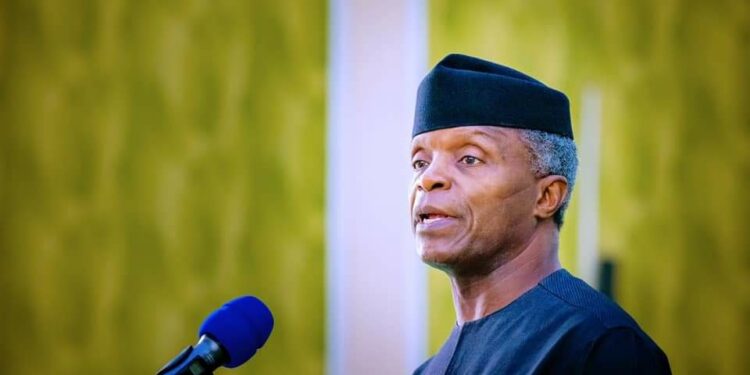The Federal Government, FG, has said it has so far disbursed over N462.2 billion to strengthen the Small and Medium Enterprises (MSMEs) operations in the country.
Giving details of the funding actions at the third Annual Lecture Series of the Development Bank of Nigeria, DBN, in Abuja last week, The Vice President, Prof. Yemi Osinbajo, stated: “In the development of the Economic Sustainability Plan (ESP) some provisions were made to support MSMEs.
“These include: a N250 billion grant containing a N50 billion MSME de-risking facility component; a payroll support scheme providing up to N50,000 in monthly salaries for up to 10 staff of qualifying businesses for a duration of three months – 1.5 million jobs have been retained through the MSME and payroll support.
“Others are, a one-off grant of N30,000 for 333,000 self-employed persons working as transporters and artisans under the Artisan and Transport Scheme; a N50,000 grant for 100,000 MSMEs; provision of financial backing up to N191 billion in loans to 34,144 MSMEs and capacity building of 125 MSMEs and loan guarantees for 1,748 businesses to the tune of N6.2 billion”
Osinbajo who was represented by the Minister of Finance, Budget and National Planning, Mrs Zainab Ahmed, expressed concern over the relatively poor MSMSEs’ contributions to the nation’s exports.
His words, “The relatively low contribution of MSMEs to exports is concerning given their significant contribution to nominal GDP and for this reason, urgent steps are being taken to alleviate the binding constraints limiting MSME participation in cross-border trade.
“It is mperative to ensure MSMEs are supported in the acquisition of skills and tools to run their businesses efficiently, manage risks and gain access to finance at competitive and affordable rates”.
He commended DBN for providing N482 billion to 208,000 MSMEs, mostly owned by women entrepreneurs, in 2021.
In his address, the Managing Director, Mr. Tony Okpanachi, noted the negative impacts of global disruptions on the local economy, especially the MSMEs and concluded that the sector required greater attention to be able to contribute significantly to the nation’s economy.
His words, “Disruptions on a global scale are now a reality in an increasingly interconnected global economy. However, there is still a compelling need for businesses to continue to innovate especially, as the world gradually recovers from the disruptions caused by Covid-19 which has affected every part of the value chain, from raw material sourcing to the end customer; to the suffering induced by the humanitarian crisis caused by Russia’s invasion of Ukraine, resulting in slower economic growth and rising inflation across nations.
“In Nigeria, we’re currently plagued with rising inflation of 20.52% (as of September 2022). We are as well afflicted with rising food and commodity prices, coupled with the rising and unstable exchange rates among others. The effects of Global disruption on international trade often come as a shock to businesses. These series of events have led to uncertainty and radical changes to companies’ well-established strategies across the globe and MSMEs are not exempted.
“The future of work is currently in a state of flux, with many old and new challenges hitting MSMEs particularly hard. Hence, Governments, corporate bodies, and individuals, mostly MSMEs must find ways to adapt to the changing times and the volatility of the market, deal with uncertainty, and figure out how to convert that into opportunities.”
Also speaking, the Chairman of the Board of DBN, Dr. Shehu Yahaya, identified insecurity in farming communities as a major challenge for the nation’s economy.
He said, “The challenges around insecurity as it relates to the agriculture sector have proven to be daunting. Farmers continue to feel unsafe on their farmland and lower yields during harvest is the unfortunate outcome. I strongly believe everyone gathered here today can appreciate the increase in food prices in the country’’.










Discussion about this post